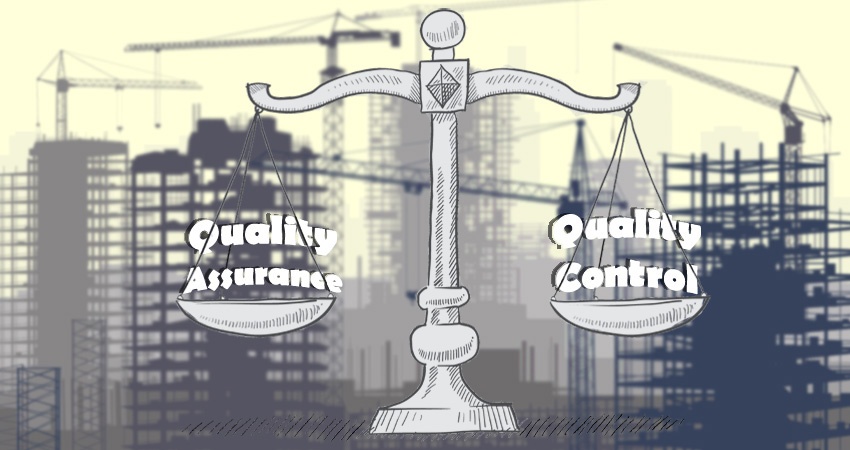Builders often refer to their construction quality programs as “QC - Quality Control” and “QA - Quality Assurance.” Obviously, both terms target “quality,” but are they interchangeable? And if not, what's the difference?
In this blog, we will elucidate the distinctions between assurance and quality control, shedding light on the pivotal role of software quality assurance in ensuring the reliability and excellence of your software products. Emphasising quality assurance methods, we'll explore systematic approaches that help identify and rectify potential issues before they impact the end-users. A robust quality management system will be highlighted as a cornerstone, providing an overarching framework to streamline processes and guarantee consistent adherence to quality standards throughout the software development lifecycle.
Understanding the synergy between these elements, we'll delve into how software testing, statistical process control, and statistical quality control act as integral components of your operation. These methodologies work hand in hand with software quality assurance, collectively fortifying your processes to deliver software that not only meets but exceeds expectations, bolstering overall efficiency and customer satisfaction.
Why do we Need Quality Control and Quality Assurance
Quality Control (QC) and Quality Assurance (QA) programs are a critical part of any project. Together, they help insure that the project is not just on budget, but also on time and to owner satisfaction. QC programs focus on monitoring the project’s activities to make sure that they are consistent with the design, safety, and quality standards. They also provide information for improvement activities.
QA programs go hand-in-hand with a quality management plan. They ensure that the project management team and the construction personnel are following the design instructions, as well as monitoring the project's quality. The QA department provides information for quality control and is also responsible for providing information on the project's schedule, budget, and the owner's satisfaction.
What's More Important: Quality Assurance or Quality Control?
Besides the discussion above, there are other factors that differentiate the two. - Quality control focuses on monitoring the project's activities to make sure that they are consistent with the design, safety, and quality standards.
Quality assurance focuses on ensuring that the project management team and the construction personnel are following the design instructions, and monitoring the project's quality. - Quality control provides information for improvement activities. The goal is the improve the end-product quality and achieve customer satisfaction in all metrics.
Quality assurance provides information on the project's schedule, budget, and the owner's satisfaction. - The quality control department provides information on the project's budget, schedule, and owner satisfaction. The quality assurance department is responsible for providing information on the design, safety, and quality.
So, both play a vital role in your construction projects and go hand in hand. They are equally important.
Quality Assurance vs Quality Control - The difference explained
As mentioned prior, Quality Assurance (QA) and Quality Control (QC) in the construction industry constitute distinct levels within a comprehensive system. Quality Assurance methods, such as total quality management and capability maturity model integration, serve as structured processes aimed at ensuring the delivery of a high-quality end product. Total quality management focuses on holistic quality improvement throughout the entire construction process, while capability maturity model integration provides a framework for assessing and enhancing an organisation's software development processes.
In contrast, Quality Control (QC) involves the execution of the quality assurance plan. This includes meticulous inspection and adherence to review quality assurance practices, ensuring that the constructed elements meet the predefined quality standards. Actively incorporating best practices from both Quality Assurance and Quality Control levels is essential, as it enables the identification and rectification of potential quality issues at early stages, preventing them from evolving into more significant concerns during the construction process.
Quality Assurance is strategic and very process oriented. It's the designed and sequential activities that make up a system to measure the output of a product or service against an established standard. Put simply, QA is about understanding what's required to achieve quality, and creating a system to carry out those quality management requirements.
The main goal of either or the two is to help you fulfilling quality requirements with a consistent quality management system and give you a blueprint of the quality control activities that you'll need to conduct to prevent defects and/or identify defects.
QA is, for example, a series of checklists and inspections set at critical stages in the construction projects schedule, such as a Pre-Pour, Frame, Pre-Drywall and Final Delivery.
Together these points make-up a system that ensures construction is complete and accurate in one phase before the schedule continues to the next phase and adheres to the project owner and the customer requirements.
There is an end goal in mind to build the project on schedule which prevents defects and has overall fewer errors and rework.
Quality Control is tactical and quality management focused. It’s the act of monitoring the work as it occurs. QC ensures that material installation and the activity completion conform to the builder’s expected standards.
QC also implements corrective measures and quality management systems when those standards aren’t met.
QC happens on the jobsite and requires the quality managers, field supervision, and contractors to use the QA tools and operational techniques. For example: Before the framing crew begins their work, they review a Hot Spot photo to avoid a recurring mistake.
Then, before they leave the jobsite, the crew leader follows a checklist to ensure all items are complete. This process integrates product quality assurance principles, involving the careful auditing of suppliers and the batch sampling of raw materials. The goal is to systematically verify that every aspect of the construction meets the stipulated quality standards, thereby reducing the likelihood of callbacks and ensuring a seamless, high-quality outcome.
In addition, the Contractor undertakes a framing inspection before authorising the HVAC crews to commence their work. This step underscores the commitment to ensure quality at every phase of the construction process. Moreover, it reflects a broader focus on quality improvement, emphasising the continuous enhancement of construction practices to achieve higher standards and optimal efficiency.
Both parts – the planning and the execution – are essential to deliver a quality project. But with most builders, a great deal of time and detail are invested in creating a comprehensive Quality Assurance Program, only to have it fall apart at execution.
The daily grind of the jobsite overrides the task of completing checklists and performing inspections, your quality system and Quality Control goes by the wayside. Thus recurring errors continue, callbacks waste more time and money, and the quality of the end product suffers.
Final Thoughts
When you have a clear understanding of the differences between Quality Control and Quality Assurance, you are better equipped to manage the quality of your project. Successful construction projects are completed on time, on budget, and with the desired quality. With FTQ's quality assurance program and quality control practices, you can be certain that your project will be a success
More on QA QC Construction
- What Is QA/QC Planning for a Construction Project?
- 5 Core QAQC Functions for Construction Projects
- Best Ways to Use the QAQC Construction program For Training
- 6 Best Practices to Improve Construction Quality Control Today
- The 5 Step Construction Quality Control Process


